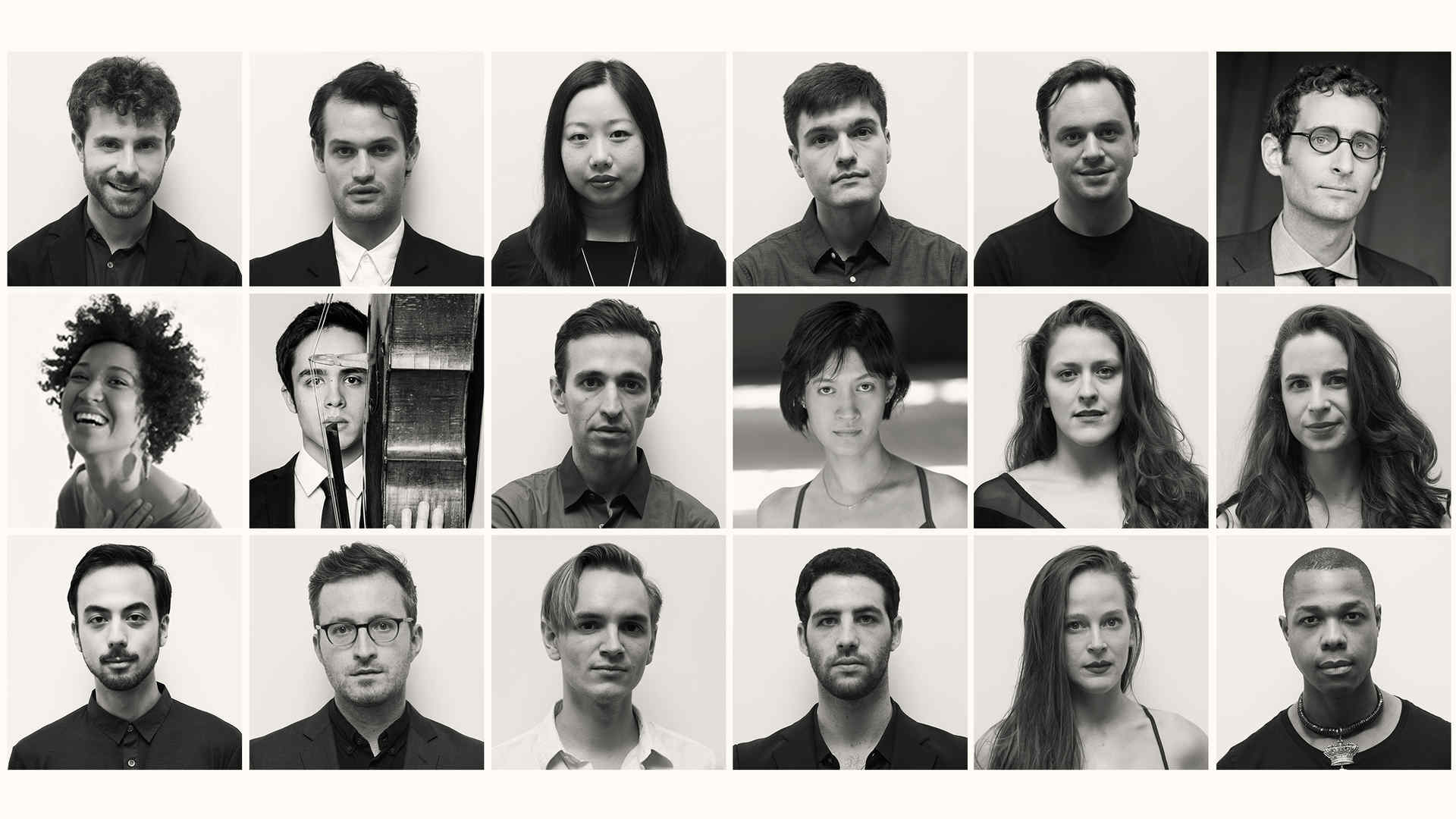
As opera companies and orchestras big and small pare down offerings or—worse—are wholly felled by the ongoing struggle with shrinking audiences and the traditional subscription model, hope for the future of the arts emerges in the birth of the American Modern Opera Company.
Helmed by co-artistic directors Matthew Aucoin (Graduate Diploma ’14, composition) and Zack Winokur (BFA ’12, dance), AMOC aspires to redefine opera and expand the art form’s reach. It is at once a traveling theater troupe, new-music ensemble, artists’ collective, and incubator for its core members’ “most ambitious and experimental projects,” according to its mission statement. The 17-person core ensemble includes 12 Juilliard alumni, three of whom are also faculty members. AMOC (pronounced “a-MUCK,” as in “to run amok”) made its public debut in December and was in residence at Harvard in February, New York City’s Park Avenue Armory in March and April, and looks forward to performances at the Metropolitan Museum of Art next season and in 2018 with San Francisco’s Philharmonia Baroque Orchestra and Chorale in a new commission composed by Aucoin and staged by Winokur. Journal assistant editor Joshua Simka did a joint interview with the two—who both hail from Greater Boston—just before the New Year.
What inspired you to found a new artist collective?
Zack Winokur: Matthew and I were caught up in this ongoing conversation with a group of our colleagues about what we felt was missing from our lives and careers. Even though people were having amazing experiences working all around the world as musicians and dancers at opera companies, we were missing the feeling of continuity and the deep collaborative relationships that allow for the possibility of thinking and working in longer units of time.
Matthew Aucoin: And that’s something we both found to be a curiosity of the classical music world. Except for certain highly specialized cases like a string quartet, instrumentalists and singers more often fall into working for pre-existing organizations in situations where they can’t necessarily choose their colleagues or, in the case of singers who move from production to production, they can’t deepen the relationship with a colleague even if there’s chemistry. We had been working barely long enough to know who a lot of our favorite colleagues are, and so we asked, Why stay prey to the winds of anonymous companies around the world asking us to do stuff? Why not gather people together and forge something deeper?
ZW: Our first meeting was a residency in August at Certain Bird, an incredible artists retreat in rural Stamford, Vt., run by dancer and choreographer Marta Miller, and our endeavor was to gather people and commit to making things. We stayed all together in the seven-bedroom farmhouse, and the relationships that started to form seemed really interesting and fruitful. It turned out we could continue that into building a real repertory company, which doesn’t have much of a precedent in opera.
You just wrapped up your public debut in Boston with the inaugural run of the AMOC! Festival in Cambridge, Mass. How did that go?
MA: In one weekend we presented three different programs—an extreme kind of programmatic diversity such that if you only went to one show, you might have come to a totally different understanding about what the company is than somebody who went to another show. A Study on Effort was an intense hourlong duet for dancer and violin. Cage Match, held at Oberon, a theatrical nightclub, consisted of musical duets that were staged— sort of tongue-in-cheek—as a boxing match. (If you happened to catch only that show, you might have thought, “What is this campy craziness?!”) And we concluded with bass-baritone Davóne Tines’ (MM ’13, voice) solo show Were You There?, which consisted largely of potent a cappella spirituals—a meditation on the recent acts of police brutality.
What city does the company call home?
MA: We actually don’t want to have a home! But our spiritual home is the farm in Vermont.
ZW: We like moving around. But in the same way that we’re committed to long-term, enduring partnerships within the company, we’re looking for those types of relationships with institutions. We want to make new relationships too, but the places that so far have supported us are places we’d like to have continuing relationships with.
What are you doing to protect AMOC’s viability?
ZW: Unlike a lot of other opera companies, we have a very slimmed-down way of channeling money, most of which goes to paying our performers. Also, a culture quickly developed among us—of friendship, collaboration, and of family. I think that was one of the principal things that has motivated this company, and it’s a good reason to keep coming back to something—more than it being just a sweet gig.
MA: One of the challenges that can face established opera companies is having to hold to an established level of activity—“We must sell out a dozen Butterflys in a colossal theater every single year”—but that doesn’t allow you to react to the possibility of a change in taste, a change in climate. These changes are catastrophes if you’re locked into a way of doing things. We hope to grow, but in proportion to our activities. We want to be reactive and agile and so far that’s how we’re operating.
Joshua Simka (BM ’14, voice) is the assistant editor of the Journal
____________________________________________________________________________________________________________________________________
Above: AMOC’s core ensemble includes Matthew Aucoin*, Zack Winokur*, Jennifer Chen, Jonny Allen, Paul Appleby*, Doug Balliett*, Julia Bullock*, Jay Campbell*, Anthony Roth Costanzo, Miranda Cuckson*, Julia Eichten*, Emi Ferguson*, Keir Gogwilt, Conor Hanick*, Coleman Itzkoff, Or Schraiber, Bobbi Jene Smith*, and Davóne Tines*
*Juilliard alumnus